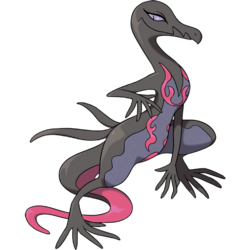From Bulbapedia, the community-driven Pokémon encyclopedia.
Salazzle (Japanese: エンニュート Ennyūto) is a dual-type Poison/Fire Pokémon.
It evolves from a female Salandit starting at level 33.
Biology
Salazzle is a dark grey Pokemon resembling salamanders and lizards. It has a thin dark grey body with a purple underside. Its head is dark grey with purple eyes and slit pupils. There are several tooth-like protusions on the lower jaw. Salazzle's body has three pink markings, one on the chest, which splits to form a 'U' shaped design, and the other two on the abdomen, forming two 'f'-shaped patterns. Salazzle has a long, dark grey tail with a pink underside and two protrusions come out form the tail's base.
It has hands and feet with five digits each. These digits are long and thin.
Salazzle is a female-only species. It creates a reverse harden with the male salandit it lives with.
Game data
Pokédex entries
| This Pokémon was unavailable prior to Generation VII.
|
| Generation VII
|
|
| Sun
|
For some reason, only females have been found. It creates a reverse harem of male Salandit that it lives with.
|
| Moon
|
Filled with pheromones, its poisonous gas can be diluted to use in the production of luscious perfumes.
|
|
|
Game locations
| This Pokémon was unavailable prior to Generation VII.
|
|
|
In side games
Held items
Stats
Base stats
| Stat
|
Range
|
| At Lv. 50
|
At Lv. 100
|
68
|
|
128 - 175
|
246 - 340
|
64
|
|
62 - 127
|
119 - 249
|
60
|
|
58 - 123
|
112 - 240
|
111
|
|
104 - 179
|
204 - 353
|
60
|
|
58 - 123
|
112 - 240
|
117
|
|
109 - 185
|
215 - 366
|
Total: 480
|
Other Pokémon with this total
|
- Minimum stats are calculated with 0 EVs, IVs of 0, and (if applicable) a hindering nature.
- Maximum stats are calculated with 252 EVs, IVs of 31, and (if applicable) a helpful nature.
|
Type effectiveness
| Under normal battle conditions in Generation IX, this Pokémon is:
|
|
|
|
|
|
|
|
|
|
|
|
|
Learnset
|
|
|
|
- Bold indicates a move that gets STAB when used by Salazzle
- Italic indicates a move that gets STAB only when used by an Evolution of Salazzle
|
|
|
|
|
- Bold indicates a move that gets STAB when used by Salazzle
- Italic indicates a move that gets STAB only when used by an Evolution of Salazzle
|
|
|
|
|
- Moves marked with an asterisk (*) must be chain bred onto Salazzle in Generation VII
- Moves marked with a double dagger (‡) can only be bred from a Pokémon who learned the move in an earlier generation.
- Moves marked with a superscript game abbreviation can only be bred onto Salazzle in that game.
- Bold indicates a move that gets STAB when used by Salazzle
- Italic indicates a move that gets STAB only when used by an Evolution of Salazzle
|
|
|
|
|
- A black or white abbreviation in a colored box indicates that Salazzle can be tutored the move in that game
- A colored abbreviation in a white box indicates that Salazzle cannot be tutored the move in that game
- Bold indicates a move that gets STAB when used by Salazzle
- Italic indicates a move that gets STAB only when used by an Evolution of Salazzle
|
|
|
|
|
- Bold indicates a move that gets STAB when used by Salazzle
- Italic indicates a move that gets STAB only when used by an Evolution of Salazzle
|
Evolution
Trivia
Origin
Salazzle appears to be based on a salamander and lizards of the teiidae family, also known as "whiptails". Certain whiptail species have a mostly female population, some species even being female exclusive.
Name origin
Salazzle may be a combination of salamander and dazzle or sizzle.
Ennyūto may be a combination of 炎 en (flame) or 艶 en (bewitching) and newt.
In other languages
| Language
|
Title
|
Meaning
|
 Japanese Japanese
|
エンニュート Ennyūto
|
From 炎 en or 艶 en and newt
|
 French French
|
Malamandre
|
From mal and salamandre
|
 Spanish Spanish
|
Salazzle
|
Same as English name
|
 German German
|
Amfira
|
From Amphibie and fire
|
 Italian Italian
|
Salazzle
|
Same as English name
|
 Korean Korean
|
염뉴트 Yeomnyuteu
|
From 염 (炎) yeom or 염 (艷) yeom and newt
|
 Mandarin Chinese Mandarin Chinese
|
焰后蜥 Yànhòuxī
|
From 焰 yàn, 艷后 yànhòu, and 火蜥蜴 huǒxīyì
|
 Cantonese Chinese Cantonese Chinese
|
焰后蜥 Yihmhauhsīk
|
From 焰 yihm, 艷后 yihmhau, and 火蜥蜴 fósīkyihk
|
|
|
|
|
|
|
|
Related articles
External links

|
This Pokémon article is part of Project Pokédex, a Bulbapedia project that aims to write comprehensive articles on each Pokémon species, as well as Pokémon groups and forms.
|















